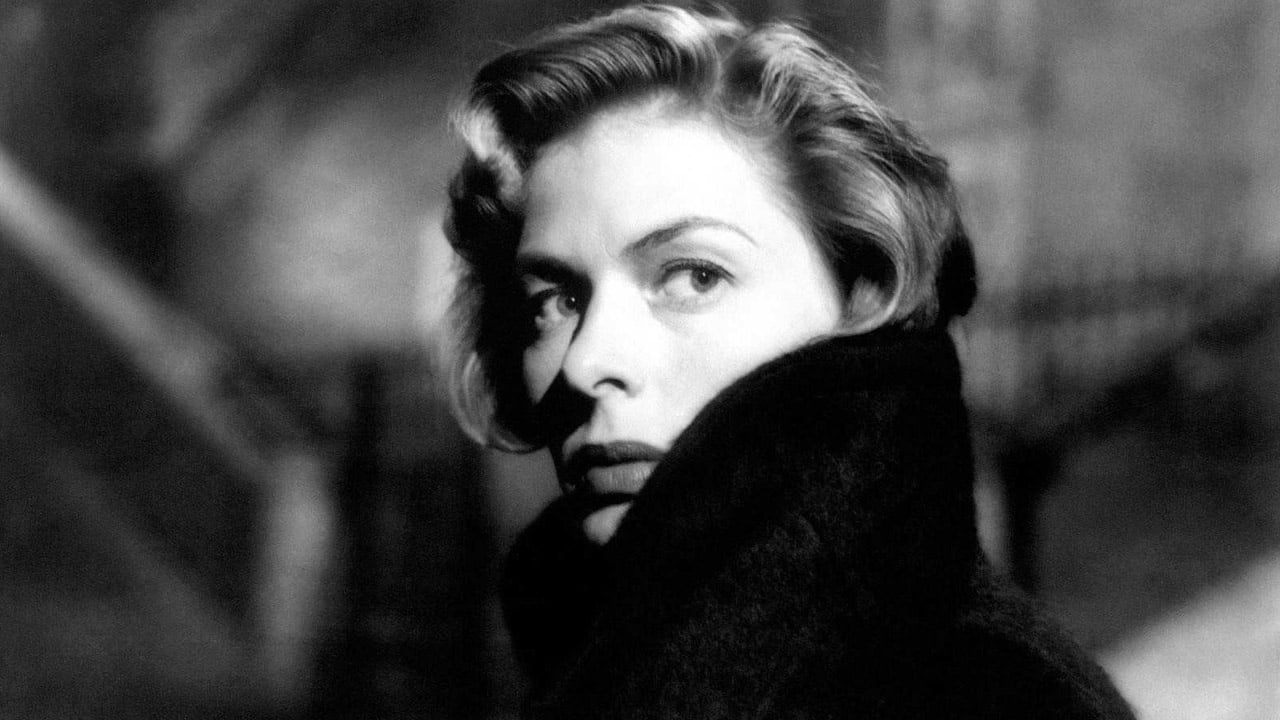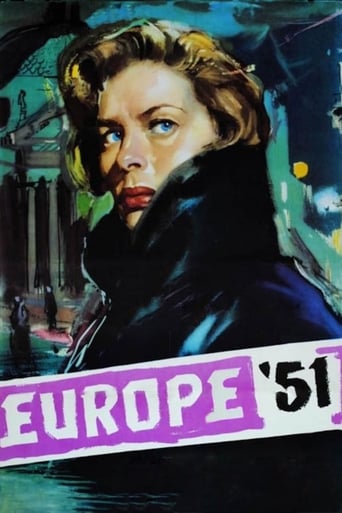



What a waste of my time!!!
That was an excellent one.
Such a frustrating disappointment
One of the film's great tricks is that, for a time, you think it will go down a rabbit hole of unrealistic glorification.
View MoreRoberto Rossellini's film starring his lover Ingrid Bergman casts her as a spoiled wife in a wealthy set in Rome in the early 50s. Her 12-year-old son, striving to get her attention, succeeds tragically, and in the aftermath she throws herself into efforts to help some of the multitude of people impoverished by the war. A friend who's a newspaperman and socialist nurtures her interest with books and projects, but political solutions seem spiritually empty to her, so she continues to seek her own way. Though her friendly acceptance by poor people seems improbable, she revels in the vitality of their lives, in contrast to the chill of her aristocratic class. Some fine minor roles include Giulietta Masina (Federico Fellini's muse) as a single woman with six children, who can't wait to get together with the likely father of number seven. This cheery earth-mother, who bathes, feeds, and lovingly scolds her brood, through Bergman's intervention gets a factory job - I couldn't help wondering who was going to look after her bambini while she was at work all day. Later Bergman shields a young man involved in armed robbery, and though he turns himself in, the police chief's attention falls on her - what is she up to and why? Obviously, she must be insane. And off to the asylum she goes, more agreeably than I would have expected. Her husband visits to speak to the doctor, but not to her. As she settles into the community there, it grows apparent that she's getting further away from ability to return to a "normal life" in her class. The kindness she feels toward humanity finds an outlet in responding to the distress of fellow patients, and finally she becomes something of a saint. It's all so heartfelt and innocent - an antidote perhaps to the horrors of the recently ended war? Rossellini likes to put her in surroundings that contrast with her character, to heighten her changes of heart - but he also likes to dress her in expensive dresses and furs - this woman is not the Ilsa Lund of Casablanca - she has the passion to do good for others, but she is also a woman accustomed to luxury, for which the director offers no apology.
View More***SPOILERS*** Kicked out of Hollywood as well as the USA because of her illicit affair, that resulted in the birth of her daughter, with Italian director Raborto Rosselini during the filming of the movie "Stromboli" Irgrid Bergman came back swinging two years later with the movie "Europa 51" as the deeply depressed and almost suicidal Irene Girard. It was Irene's partying and high living that lead to he 12 year old son Michele, Sandro Franchina, in being ignored by her to jump down a flight of stairs and end up killing himself. In finding out the reason for Michele's, in a death bed confession, strange action Irene loses it and almost, by trying to kill herself, follows her son to his grave.It's Irene's good friend communist and community organizer Andrea Casatti, Ettone Liannina, who fills her confused mind up with his socialist philosophy that screws her up even more then she already was. Leaving her rich life and luxury home in Rome Irene goes down to the slums of the city to help those unfortunate souls who's lives have been turned to sh*t because of the capitalist system that her husband George, Alexander Knox, a major Italian industrialist is a part of. As things turned out for Irene her helping the poor and downtrodden ended up with her being committed into a mental institution with her husband, who by then was estranged from her, George signing the admittance papers. It's in that mental institution that Irene finally found herself and her reason in life as well as a new home to help those souls that society has totally discarded.A bit too much to take with Ingrid Bergman playing a Mother Theresa, before anyone ever heard of her, but does a very convincing job of doing it. Bergman's acting, which was excellent, may have come more from the personal tragedies that she was suffering at the time in being condemned by the church as well as on the floor of the US Congress as being a disgrace to all thats good and decent in life because of her affair with Roberto Rosselini. That had her enhanced her acting in the part of Irene Girard that made her part so convincing. The movie also downplayed the fact that going red or communist was the way to find salvation with it, by Irene trying it, only lead to disaster to those she at first tried to help. It was Her total rejection of feeling sorry for herself and not make any excuses for the raw deals that she suffered in life that in the end made her a better person to herself as well as those that she unselfishly, without wanting any rewards, went out of her way to help.
View MoreIt's a bit melodramatic, but up until Irene's final conversation with Cassatti the Commie, *Europa '51* is a very interesting film, first about a pampered rich woman's reaction to her son's death, then about the difference between windy Marxist propaganda and real compassion.However, at that point, Rossellini's original idea takes over: He wanted to make a film about what would happen if a truly saintly person ever showed up in the modern world. And he had a very good idea of what would happen--or at least a very insistent one. The people here obviously behave the way they do solely to make the point Rossellini wants to make, even when their behavior doesn't seem very plausible. In defter hands, such manipulation can work. Here, though, you can see the tracks Rossellini has rather clumsily laid down to move the story where he wants it to go.
View MoreI suppose that when "Europa '51" was going to be filmed there was a great professional mutual understanding between Rossellini (the director) and Ingrid Bergman (main actress). It's really astonishing the way Ingrid Bergman's face changes throughout the movie. She really looks like a "human God" (specially towards the end) just by looking at her expressions. If you have the opportunity of watching "Europa '51" twice, you will notice that her character in the beginning of the story, where Irene Girard (Ingrid Bergman) is the mother of a well-off family, is totally different from the last shots. I also like how Irene contrasts with the way of living of the poor children and working-women. Although Rossellini's movie is a bit lengthy, bearing in mind it was made in Italy in 1952, many events occur with short scenes perfectly connected obtaining a gorgeous dynamism as a whole. I'm almost sure that my favorite scene is the same as the majority of the people who watched "Europa '51". I refer to the moving ending of the story. I also like how the camera moves around capturing the contrast of expressions between the sick patients and Irene. I encourage everybody to watch this masterpiece, even twice!
View More